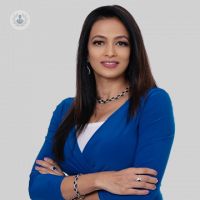Autism in children and adolescents
Written by:In today's society, we are seeing an increase in the number of children being diagnosed with autism. We speak to revered consultant child and adult psychologist Dr Ramya Mohan who provides an in-depth analysis of the condition, including which signs to look out for, the clinical presentation of the condition, what it means to be a minor with neurodiversity in a changing world and an explanation of how a specialist can help.

What are the main characteristics of autism in children?
Over the last few decades, our understanding of autism has evolved greatly. We have come to recognise it as a cluster diagnosis, encompassing a range of challenges that are pervasive across various contexts. Diagnosis typically requires meeting specific criteria related to social interaction, communication, and a certain degree of rigidity in behaviours, routines and thinking processes. Autism is a multi-layered, spectrum condition which can manifest in diverse and complex ways, presenting unique challenges for those who have it.
At what age is autism typically identified in children?
It can be difficult to pinpoint an exact age at which autism is identified due to its complex nature; it is described as a neurodevelopmental condition, with difficulties at birth that persist through life. It can be characterised by a persistent/varying array of challenges starting from infancy, continually influencing various aspects of life. Depending on the severity of the condition, it may be quite overt and get diagnosed quite early, in infants as young as 18 to 24 months old. On the other hand, high functioning autism, particularly in girls, may be complex in its presentation and difficult to diagnose until they are older.
As previously mentioned, autism is a spectrum disorder. Certain individuals with the condition are extremely high-functioning and excel in their lives and careers on the surface. However, they can find it difficult to interact in social situations, and to form connections with other people. These difficulties could arise in young people once they start school, in the classroom or when they are faced with life transitions. We are increasingly seeing more and more adults getting diagnosed with autism- it can be diagnosed in individuals of any age and stage in life, depending on its presentation.
Does autism tend to run in families?
Yes, autism can run in families, therefore when assessing an individual for autism, we ensure that we take a detailed family history regarding neurodevelopmental difficulties of any kind.
Autism may develop due to the way the brain is wired, potentially due to trauma in the prenatal period or in the context of a certain vulnerability genetically; there are a variety/combination of factors that could potentially cause Autism.
What is the clinical presentation of a child who has Autism?
In order to diagnose a child or young person with Autism, we assess difficulties with social communication (which in turn, can cause problems in making or sustaining friendships, navigating social interactions, comprehending social cues, and understanding emotions). If these difficulties are present in the context of reasonable self-awareness of emotional dysregulation and/or impaired overall functioning (within familial, social or situational contexts), whether this perception arises from within themselves or is observed by others, a sense of not fitting in or understanding their surroundings may prevail.
These diverse presentations are areas we aim to explore and address. Their impact resonates in various aspects of daily life, influencing self-management, self-perception, and familial or social dynamics. We encounter a spectrum of presentations, with the individual being oblivious of the difficulties they are facing or where they are quite happy to be by themselves. The absence of a desire for interpersonal interaction or relational ties also raises concerns which require further exploration.
How can a specialist help?
With any kind of child and adolescent presentation, it is crucial to understand the origin of some of the difficulties, and why the young person is not able to function optimally. This is the starting point.
In the context of autism, the assessment process holds immense significance due to the intricate and multifaceted nature of the condition. An autism assessment must be conducted by a highly trained and experienced professional such as a child and adolescent Psychiatrist, a developmental paediatrician or a clinical Psychologist. Employing a multi-source, multi-disciplinary approach is key to an accurate diagnosis. This involves following semi-structured assessment schedules and meticulously interpreting gathered information to construct a detailed roadmap of the individual's challenges within the framework of autism/autism spectrum disorder (ASD). It is essential to be aware of and assess the role of co-morbid mental health/physical health difficulties in any presentation.
I am trained in conducting the 3Di (The 3 dimensional interview), the Autism Diagnostic Interview Revised (ADI-R), and the Autism Diagnostic Observation Schedule 2 (ADOS-2), all of which we routinely use in our clinical practice. A collaborative approach with other professionals further ensures the robustness and validity of the diagnostic process. With over 15 years of specialist experience as a Child and Adolescent Psychiatry Consultant specialising in Neurodevelopmental conditions, as well as 20 years experience in CAMHS Psychiatry, I understand the importance of training, expertise and collaborative efforts within a multi-professional ecosystem when working with children.
If you are concerned that your child has autism or an autism spectrum condition and would like to book a consultation with Dr Mohan, do not hesitate to do so by visiting her Top Doctors profile today.


